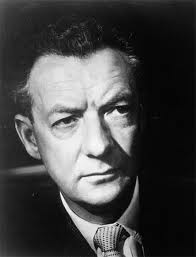November 19, 2018. Three 20th century composers. Benjamin Britten was born on November 22nd of 1913 in Lowestoft, the easternmost town in the UK. The greatest British composer of the 20th  century, he was also the leading opera composer of his time, having written such classics as Peter Grimes, Billy Budd, and The Turn of the Screw. Britten received his first musical lessons from his mother; he then continued taking lessons at Lowestoft and later – at the Royal College of Music in London. In 1934, while Britten was still studying at the Royal College, he had his first composition, the Sinfonietta, Op. 1, performed in public (by then he had written many pieces he would later dismiss as juvenilia). After graduating, he worked for the BBC movie unit and wrote music for theater and radio. London was (and is) one of Europe’s music centers; Britten went to many concerts and fell in love with the music of Mahler (Das Lied von der Erde in particular); Berg (especially Wozzeck) and Stravinsky also left a big impression (he even wanted to study with Berg but that never worked out). In 1937 Britten met the young tenor, Peter Pears, who became a personal and professional partner for the rest of his life (Pears outlived Britten by 10 years). In April of 1939 Britten and Pierce sailed to America; both were pacifists and felt uncomfortable in Europe, also several of their friends, like W. H. Auden and Christopher Isherwood, had moved to the US. As WWII began, they decided to return to Britain, but the British Embassy persuaded them to stay on as “cultural ambassadors.” Still, in 1942 they returned, and Britten started working on the opera Peter Grimes, which he completed in 1944. It premiered in 1945 at Sadler's Wells Opera, now English National Opera, London’s second (after the Covent Garden) opera house. Here are Four Sea Interludes from "Peter Grimes", with Leonard Bernstein conducting the Boston Symphony Orchestra. Peter Grimes was both a critical and popular success, and it established Britten as a foremost British composer. This is Bernstein’s last recording, made live in Tangelwood on August 19th of 1990. Bernstein died in New York a month and a half later.
century, he was also the leading opera composer of his time, having written such classics as Peter Grimes, Billy Budd, and The Turn of the Screw. Britten received his first musical lessons from his mother; he then continued taking lessons at Lowestoft and later – at the Royal College of Music in London. In 1934, while Britten was still studying at the Royal College, he had his first composition, the Sinfonietta, Op. 1, performed in public (by then he had written many pieces he would later dismiss as juvenilia). After graduating, he worked for the BBC movie unit and wrote music for theater and radio. London was (and is) one of Europe’s music centers; Britten went to many concerts and fell in love with the music of Mahler (Das Lied von der Erde in particular); Berg (especially Wozzeck) and Stravinsky also left a big impression (he even wanted to study with Berg but that never worked out). In 1937 Britten met the young tenor, Peter Pears, who became a personal and professional partner for the rest of his life (Pears outlived Britten by 10 years). In April of 1939 Britten and Pierce sailed to America; both were pacifists and felt uncomfortable in Europe, also several of their friends, like W. H. Auden and Christopher Isherwood, had moved to the US. As WWII began, they decided to return to Britain, but the British Embassy persuaded them to stay on as “cultural ambassadors.” Still, in 1942 they returned, and Britten started working on the opera Peter Grimes, which he completed in 1944. It premiered in 1945 at Sadler's Wells Opera, now English National Opera, London’s second (after the Covent Garden) opera house. Here are Four Sea Interludes from "Peter Grimes", with Leonard Bernstein conducting the Boston Symphony Orchestra. Peter Grimes was both a critical and popular success, and it established Britten as a foremost British composer. This is Bernstein’s last recording, made live in Tangelwood on August 19th of 1990. Bernstein died in New York a month and a half later.
As for Britten, we’ll have to return to the second half of his life – his operas, songs and symphonic works – at another time. For now, here’s an aria from Peter Grimes,Embroidery in childhood. Ellen is wonderfully sung by the soprano Renée Fleming, Balstrode is the baritone Jonathan Summers. London Symphony Orchestra is conducted by Sir Georg Solti.
Polish composer Krzysztof Penderecki was born 20 years after Britten, on November 23rd of 1933, but his music belongs to a very different era. It’s much more “avantgarde,” at least the music he wrote in the first half of his creative life. Penderecki has said that as a child he was very religious: “My family was very open. My grandfather was German and a Protestant. My father, a lawyer, was Greek-Catholic and played the violin. My mother was very religious and went to church twice a day. My grandmother was Armenian. So I was raised with three different faiths - that's why I am so open.” This probably explains Penderecki’s interest in religious themes: in 1958 he wrote Psalms of David for mixed choir, string instruments and percussions; in 1966 – The St Luke Passion; then a choral work Canticum Canticorum Salomonis in 1973 and a year later, the orchestral piece, The Dream of Jacob. Here’s the first movement of Part I of St. Luke Passion, "O Crux ave." Antoni Wit conducts the Warsaw National Philharmonic and Choir, Warsaw Boys Choir and the soloists.
Another very interesting 20th century composer, Alfred Schnittke was born on November 24th of 1934. We’ll have to write about him another time.
| Source: | https://www.classicalconnect.com/node/12791 |
| Website: | Classical Connect |